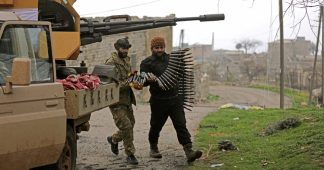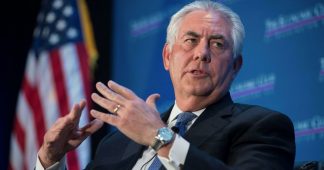Two events, just minutes apart, had very different messages.
By Rhys Dubin
U.S. President Donald Trump again signaled a change in his administration’s anti-Islamic State policy in Iraq and Syria, this time as three top U.S. officials publicly restated the United States’ long-term commitment to the campaign.
“I want to get out. I want to bring our troops back home,” Trump said during a press conference Tuesday with the presidents of Baltic states at the White House. He also suggested that Saudi Arabia could finance a continued U.S. military presence.
The president’s comments came minutes into a separate public event held just blocks from the White House in which Centcom commander Gen. Joseph Votel, U.S. Agency for International Development Administrator Mark Green, and Special Presidential Envoy for the Global Coalition to Counter the Islamic State Brett McGurk all spoke. The three men are the top military, diplomatic, and development officials responsible for the campaign against the Islamic State.
In stark contrast to Trump’s emphasis on a quick withdrawal following the Islamic State’s military defeat, Votel emphasized the ongoing and diplomatically complex nature of the American post-combat role in Syria. “The hard part is in front of us,” he said. “That is stabilizing these areas, consolidating our gains, getting people back into their homes.”
Special Envoy Brett McGurk in turn noted the role both American military and diplomatic assets had played in staving off violence between Turkey and Syrian Kurdish allies of the United States. “It’s incredibly complex,” McGurk said, “But we have to work through this diplomatically with our NATO allies and reassure our partners on the ground in Manbij.”
Currently, the United States has roughly 2,000 soldiers in Syria, and along with regional allies, has taken back more than 90 percent of the territory formerly held by the militant group. Two coalition soldiers, one American and another British, were killed by a roadside bomb several days ago.
This is not the first time Trump has thrown a very public wrench into stated U.S. policy in Syria and the counter-Islamic State fight. Just last week, he promised that the United States would be “coming out of Syria, like, very soon” — once again contradicting public Pentagon statements released just hours earlier.
Earlier in the same event with the Baltic presidents on Tuesday, however, it looked as though Trump had started to backtrack on those comments. “We will not rest until ISIS is gone,” and until American allies were consulted, he said during the joint press conference. The tone changed just minutes later.
Still, some outside of the administration were confident that U.S. officials would be able to work around the president’s capriciousness, noting that the biggest contrast was, in reality, with the plan laid out by former Secretary of State Rex Tillerson several months ago.
In a speech at Stanford University’s Hoover Institution in January, Tillerson detailed five points that translated into a nearly indefinite military and diplomatic role for the United States in parts of eastern Syria. “Those plans are completely incompatible with what we’re hearing, but he’s gone now,” says Faysal Itani, a senior fellow at the Atlantic Council.
“There’s going to be this blank space where the military and Trump can hopefully converge,” Itani tells Foreign Policy. “I agree that it’s ridiculous, but I think the people who have to handle it can find a way to get through it.”











